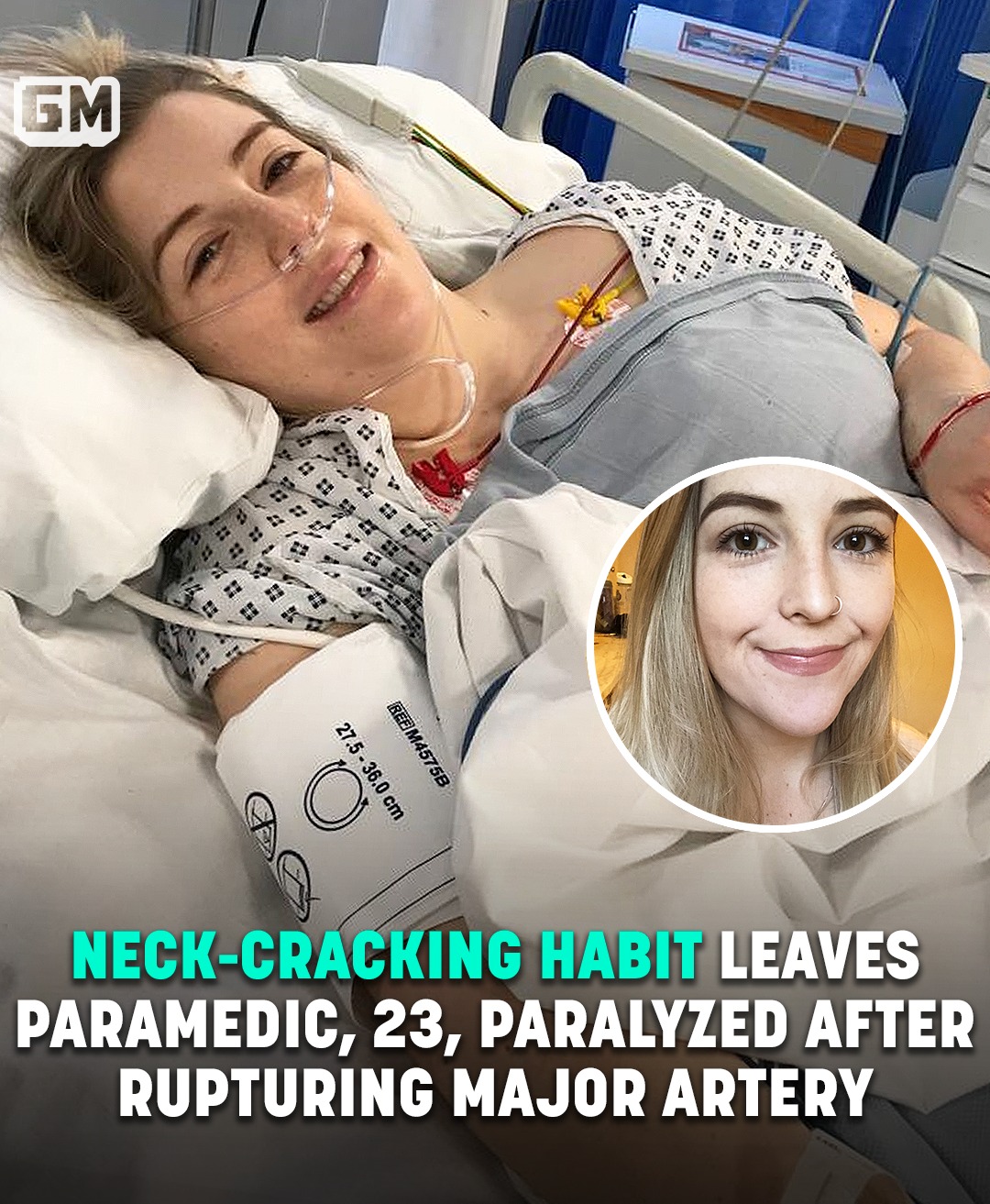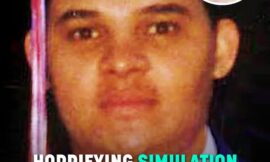Natalie Kunicki, who works for the London Ambulance Service, is warning others of the risks of cracking joints.
The paramedic, who moved from Canberra, Australia, to join the LAS, was watching movies in bed with a friend after a night out when she stretched her neck and heard a loud ‘crack.’
She thought nothing of it at first; however, when she woke up just 15 minutes later, she couldn’t move her left leg and fell to the floor when she tried to walk.
After being rushed to the hospital, where she had a CT scan, Kunicki learned she had suffered a stroke.
Natalie Kunicki heard a loud ‘crack’ when she stretched her neck. Credit: Kennedy News and Media
When Kunicki had stretched her neck, her vertebral artery – a major artery in the neck – had burst, causing a blood clot to form in her brain, triggering a stroke.
The paramedic said the diagnosis was so shocking that she became ’emotionless’ for days. Fortunately, with the help of friends, she overcame the blow.
“People need to know that even if you’re young, something this simple can cause a stroke,” Kunicki said.
“Every minute, more of your brain cells are dying, so don’t ever discount a stroke just because someone is young.
“And people need to be more mindful when doing any chiropractic exercises or strenuous gym weights.”
Natalie Kunicki is now warning others of the dangers of cracking joints. Credit: Kennedy News and Media
Opening up about the night, Kunicki recalled: “I was in bed watching stuff with a friend when it happened.
“I stretched my neck, and I could just hear this ‘crack, crack, crack.’ My friend asked ‘Was that your neck?’ but all my joints crack quite a bit, so I didn’t think anything of it. I just laughed.
“I fell asleep, and when I woke up about 15 minutes later. I wanted to go to the bathroom, but I could feel this leg on the bed, and I was asking my friend if he could move his leg.
“He told me it was my leg, but I was a bit tipsy, so I wasn’t taking anything seriously and just thought ‘That’s a bit weird.’
“I got up and tried to walk to the bathroom, and I was swaying everywhere. I looked down and realized I wasn’t moving my left leg at all, then I fell to the floor.
“My friend had to come and pick me up. He thought I was drunk, but I knew something else was wrong. I thought I had been drugged. The date r*** drug can cause paralysis.”
Natalie Kunicki was left shocked when she learned she had suffered a stroke. Credit: Kennedy News and Media
Kunicki admitted she was initially hesitant to ring 999 as she didn’t want a crew she knew to turn up and see her ‘tipsy,’ so she tried to get back to sleep.
After struggling to fall asleep, she put her embarrassment aside and called emergency services.
She recounted: “I was trying to call 999, but I was dithering about it. There was a high chance the crew who turned up would be my friends, and I didn’t want them to see me tipsy.
“I tried to go back to sleep, but I couldn’t, so I called 999, and I didn’t recognize the crew who turned up.
“I think they did look at me at first like they thought I was just a classic drunk 23-year-old, but I told them I was a paramedic and I knew something was wrong.”
Natalie Kunicki’s burst artery was discovered by doctors when she underwent a three-hour surgery. Credit: Kennedy News and Media
Kunicki explained that she doesn’t smoke, doesn’t really drink, and doesn’t have a family history of strokes.
She said: “I was in shock for about three days in ICU. I was a bit of a wet blanket. I didn’t really say much, and I wasn’t engaging with anyone. I had no sense of humor.
“I was just completely shut off, trying to compute what had happened. People said I was a bit like a robot and didn’t show much emotion.
“But a couple of my friends from the ambulance service told me, ‘You have a week from the day of your stroke to snap out of this or we will snap you out of it.’
“I was able to have my little pity party for a week, but that’s it. They told me, ‘What’s done is done now, just work and do all the exercises.’
“They were fantastic, and they would come in and do all the exercises with me.
“I think if I didn’t have them, I would have been in my pity party quite a bit longer, but instead I smashed through all the therapy goals.”
Kunicki’s burst artery was discovered by doctors when she underwent a three-hour surgery at the National Hospital for Neurology and Neurosurgery.
Although the paramedic’s artery was able to be repaired with a stent, they couldn’t clear the clot in her brain – they believe it will dissolve with time.
Natalie Kunicki described the experience as ‘surreal.’ Credit: Kennedy News and Media
“I expected to wake up from this miracle surgery and everything would be fixed, but my mobility was worse, and they couldn’t clear the clot,” Kunicki shared.
“At the start, I couldn’t move my thumb and forefinger. I could kind of move my wrist up and down. I couldn’t lift my arm. I could bend my left leg, but I couldn’t wiggle my toes.
“The doctors would do tests, I had to close my eyes, and they would touch my left side, but I couldn’t tell where they were touching.
“It was like when you have really bad sunburn and your skin is sizzling. I felt that all down my left side.
“I think I scared my consultant because after I woke up, she came in to ask how I was going, but I told her, ‘You should have killed me.’
“Depression is really common after a stroke because you lose so much of your independence and your dignity.
“I had to have a nurse help me shower in a wheelchair. What 23-year-old needs someone to help them shower and wash their hair? It was just a bit surreal.”
After recovering some movement and sensation, Kunicki began feeling ‘much better.’
She’s now committed to raising more awareness of strokes in young people – even as a healthcare professional, she was surprised to learn how common strokes in young people and children are.
Natalie Kunicki is now committed to raising more awareness of strokes in young people and children. Credit: Kennedy News and Media
Kunicki explained: “I have been called out to so many people having strokes, and they’re always in their 70s or 80s. I have never been to a young person having a stroke.
“Mine was one in a million, but a ruptured vertebral artery is actually quite a common cause of strokes in young people.
“They will be in the gym or doing something quite physical, and it happens. Strokes are also quite common in kids.
“It was a shock for me. I thought as a professional I would have an idea, but even I didn’t know.
“Normally, if you’re called out to a young person, you wouldn’t do a test for a stroke.
“I’m lucky that I’m a paramedic, and when I told the crew I knew something was wrong, they listened.
“But there was a chance that they could have not taken me seriously, so it’s really important for me to raise awareness that this can happen.”
medical new today says : “Stroke is a potentially debilitating medical condition that occurs when there is a blocked blood vessel in the brain or it bursts, hindering blood flow to the brain and leading to brain cell death.
“Strokes are more common in older adults. However, the Centers for Disease Control and Prevention (CDC) state that a person can have a stroke at any age. They say that 1 in 7 strokes occurs in people aged 15–49.”



